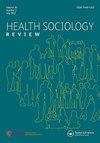The dietetics and naturopathy professions: perceptions of role boundaries
IF 2.5
2区 医学
Q2 HEALTH POLICY & SERVICES
引用次数: 4
Abstract
ABSTRACT Dietary counselling and management form core parts of both dietetic and naturopathic practice. However, each profession is unique with its own philosophies and requirements for membership. The neo-Weberian ‘sociology of professions’ provided the framework for the thematic analysis of in-depth interviews with ten leading clinicians. This study aimed to explore the perception of roles and role boundaries between practising naturopaths and dietitians using a specific example: food intolerances expressing as functional bowel disorders (FBDs). The similarities and differences in the ways dietitians and naturopaths diagnose and treat FBDs were examined. Three main themes were apparent (i) patient-centred care, (ii) evidence-based practice, and (iii) perceptions of the ‘other’ profession. Far more similarities than differences between the two professions were evident: individualised, holistic treatments, use of referral networks and evidence-based medicine formed core components of both. The main difference centred on naturopaths’ use of both traditional knowledge and scientific evidence during diagnosis and the formulation of treatment plans, including prescribing ingested medicines. Both groups deployed marked exclusionary strategies to protect their professional boundaries, including the use of discursive strategies to discredit each other, reinforced by commonly held misconceptions about the ‘other’ profession. Dietitians also used a credentialist strategy to elevate and protect their status.营养学和自然疗法专业:角色界限的认知
饮食咨询和管理是饮食和自然疗法实践的核心部分。然而,每个职业都有其独特的理念和会员要求。新韦伯的“职业社会学”为十位主要临床医生的深度访谈的专题分析提供了框架。本研究旨在通过一个具体的例子来探讨执业自然疗法师和营养师之间的角色认知和角色界限:表现为功能性肠病(fbd)的食物不耐受。研究了营养师和自然治疗师诊断和治疗fbd的方法的异同。三个主要主题是明显的:(i)以患者为中心的护理,(ii)循证实践,以及(iii)对“其他”职业的看法。这两种职业之间的相似之处远远超过差异:个性化、整体治疗、转诊网络的使用和循证医学构成了两者的核心组成部分。主要的差异集中在自然疗法在诊断和制定治疗计划期间使用传统知识和科学证据,包括处方摄入药物。两个群体都采用了明显的排斥策略来保护他们的专业界限,包括使用话语策略来诋毁对方,并通过对“其他”职业的普遍误解来加强。营养师也使用资历主义策略来提升和保护他们的地位。
本文章由计算机程序翻译,如有差异,请以英文原文为准。
求助全文
约1分钟内获得全文
求助全文
来源期刊

Health Sociology Review
Multiple-
CiteScore
7.50
自引率
0.00%
发文量
14
期刊介绍:
An international, scholarly peer-reviewed journal, Health Sociology Review explores the contribution of sociology and sociological research methods to understanding health and illness; to health policy, promotion and practice; and to equity, social justice, social policy and social work. Health Sociology Review is published in association with The Australian Sociological Association (TASA) under the editorship of Eileen Willis. Health Sociology Review publishes original theoretical and research articles, literature reviews, special issues, symposia, commentaries and book reviews.
 求助内容:
求助内容: 应助结果提醒方式:
应助结果提醒方式:


